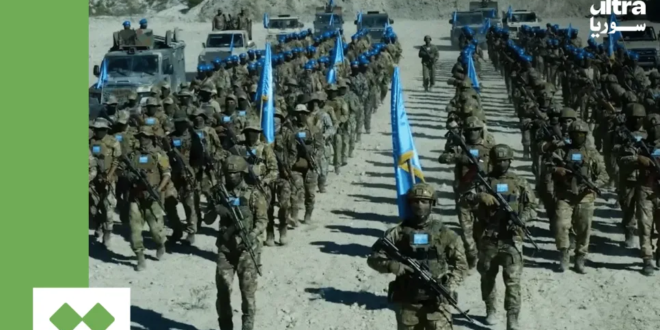The Government of East Turkestan in exile has issued a stark warning against recent efforts to integrate Chinese Uyghur fighters into the newly restructured Syrian army, calling the move a dangerous geopolitical ploy that risks distorting the Uyghur people’s legitimate struggle for independence.
In a statement posted on its official page on the platform X, the exiled government rejected any affiliation between the Uyghur cause and the so-called “Islamic Turkistan Party” (TIP), an armed group composed largely of Uyghur militants who have been active in Syria since the early years of the conflict. The statement described the TIP as “a tool of extremist Islamic ideology and a pawn for Chinese intelligence, designed to smear the East Turkestan national independence movement by linking it with terrorism and global jihad.”
The statement alleged that “thousands of Uyghurs were deceived into travelling to Syria under false pretenses,” as part of what it termed “a coordinated operation involving Chinese and Turkish intelligence services.” According to the exiled government, many of these fighters were later exploited as disposable assets in regional proxy wars that had nothing to do with the East Turkestan cause.
“These men were not defending the rights of our people,” the statement read, “but serving the agendas of foreign powers that used them for their own ends.”
The exiled authorities also warned that Beijing has capitalised on the presence of Uyghur militants in Syria as a justification for its ongoing repressive campaign in Xinjiang (referred to by Uyghur activists as East Turkestan), portraying it as a counterterrorism effort while in reality waging what the exile government calls “a campaign of genocide against our people’s identity, faith, and right to exist.”
Most Uyghurs in Syria, the statement insisted, are victims—“misled, radicalised, and exploited.” The exile government further alleged that the TIP’s leadership remains under the influence—either directly or indirectly—of Chinese intelligence services.
It called for a clear separation between rank-and-file Uyghur fighters and what it described as the “corrupt leadership” of the TIP, urging efforts to “deradicalise and rehabilitate” these individuals through what it called “authentic Islamic principles and East Turkestani nationalism.”
The statement concluded by expressing readiness to cooperate with the United States and other international partners to develop “a more secure and constructive solution for the Uyghurs currently in Syria—one aligned with global security interests and the aspirations of our people for freedom, independence, and national sovereignty.”
The warning comes amid growing reports of a formal arrangement, supported by the United States, to incorporate Uyghur fighters—formerly associated with the TIP—into the newly created 84th Division of the Syrian National Army. According to three Syrian defense officials cited by Reuters, the integration plan includes roughly 3,500 foreign combatants, most of them Uyghurs, alongside Syrian fighters.
U.S. Special Envoy for Syria Thomas Barak confirmed to the agency that Washington had reached a “verbal understanding” with the Syrian transitional government regarding the plan. “Syrian officials told us it is better to integrate the foreign fighters into the new Syrian military structure than to expel them,” Barak stated.
Osman Bughra, the TIP’s political officer, told Reuters that the group had formally dissolved and was now operating under the authority of the Syrian Ministry of Defense. “We are fully committed to the national policy,” he said, “and maintain no ties to any foreign entities or organisations.”
Still, the exile government’s statement casts doubt on the legitimacy of this transition, warning that superficial integration may do little to prevent further exploitation of the Uyghur diaspora in Syria—nor to prevent their cause from being instrumentalised for regional power plays.
 Eurasia Press & News
Eurasia Press & News




